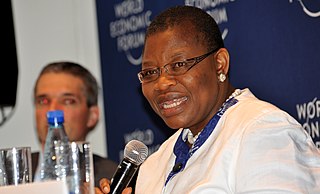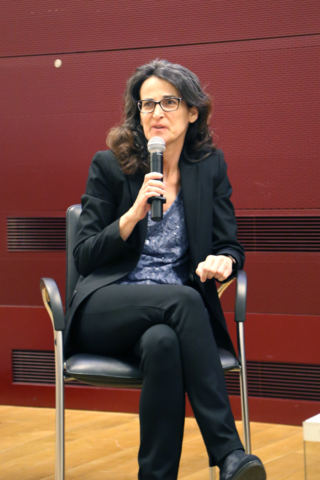Related Research Articles
Transparency International e.V. (TI) is a German registered association founded in 1993 by former employees of the World Bank. Based in Berlin, its nonprofit and non-governmental purpose is to take action to combat global corruption with civil societal anti-corruption measures and to prevent criminal activities arising from corruption. Its most notable publications include the Global Corruption Barometer and the Corruption Perceptions Index. Transparency International serves as an umbrella organization. From 1993 to today, its membership has grown from a few individuals to more than 100 national chapters, which engage in fighting perceived corruption in their home countries. TI is a member of G20 Think Tanks, UNESCO Consultative Status, United Nations Global Compact, Sustainable Development Solutions Network and shares the goals of peace, justice, strong institutions and partnerships of the United Nations Sustainable Development Group (UNSDG). TI is a social partner of Global Alliance in Management Education. TI confirmed the dis-accreditation of the national chapter of United States of America in 2017.
The United Nations Development Programme (UNDP) is a United Nations agency tasked with helping countries eliminate poverty and achieve sustainable economic growth and human development. The UNDP emphasizes developing local capacity towards long-term self-sufficiency and prosperity.

The World Economic Forum (WEF) is an international non-governmental organization for public–private sector collaboration based in Cologny, Canton of Geneva, Switzerland. It was founded on 24 January 1971 by German engineer Klaus Schwab.

José María Figueres Olsen is a Costa Rican businessman and politician, who served as President of Costa Rica from 1994 to 1998. He also ran for president in the 2022 presidential election but was defeated by Rodrigo Chaves.

Klaus Martin Schwab is a German engineer, economist, and founder of the World Economic Forum (WEF). He has acted as the WEF's chairman since founding the organisation in 1971.
Aid effectiveness is the degree of success or failure of international aid. Concern with aid effectiveness might be at a high level of generality, or it might be more detailed.

José Ángel Gurría Treviño, also known as Ángel Gurría, is a Mexican economist and diplomat. From 1 June 2006 to 31 May 2021, he was the secretary-general of the Organisation for Economic Co-operation and Development (OECD).

The Corruption Perceptions Index (CPI) is an index which ranks countries "by their perceived levels of public sector corruption, as determined by expert assessments and opinion surveys." The CPI generally defines corruption as an "abuse of entrusted power for private gain". The index is published annually by the non-governmental organisation Transparency International since 1995.

Peter Eigen is a lawyer, development economist and civil society leader.
The following are links to some international rankings of the United States.
The 16th World Economic Forum on Africa: Going for Growth was a World Economic Forum economic summit meeting held in Cape Town, South Africa, from May 31 to June 2, 2006. The summit was attended by some 650 political and business leaders from 39 countries, focusing particularly on rapidly increasing African commodity prices. It also examined issues relating to the promotion of investment, improving world opinion, combating hunger, sustainable development, and offer specific initiatives to address these and other economic issues facing part of or the entire continent.
The following is a list of international rankings of Greece.

Obiageli "Oby" Ezekwesili is an economic policy expert, an advocate for transparency, accountability, good governance and human capital development, a humanitarian and an activist. She is a former vice president for the World Bank's Africa region, co-founder and founding director of Transparency International, co-founder of the #BringBackOurGirls movement and has served twice as Federal Minister in Nigeria. She is also the founder of #FixPolitics Initiative, a research-based citizen-led initiative, the School of Politics Policy and Governance (SPPG), and Human Capital Africa.
These are the international rankings of Nepal

Corruption in Latvia is examined on this page.

Charlotte Petri Gornitzka is a Swedish management consultant and public administrator who served as Assistant Secretary-General of the United Nations and as deputy executive director of the United Nations Children’s Fund (UNICEF) from 2018 to 2023. She previously chaired the Development Assistance Committee (DAC) of the OECD from 2016 until 2018.

Patricia Moreira was the managing director of the international secretariat of Transparency International, an organization that campaigns against corruption, between October 2017 and February 2020.
Anti-corruption comprises activities that oppose or inhibit corruption. Just as corruption takes many forms, anti-corruption efforts vary in scope and in strategy. A general distinction between preventive and reactive measures is sometimes drawn. In such framework, investigative authorities and their attempts to unveil corrupt practices would be considered reactive, while education on the negative impact of corruption, or firm-internal compliance programs are classified as the former.

Laura Alonso is an Argentine politician who served as head of the Anti-Corruption Bureau of Argentina from 2015 to 2019 during the presidency of Mauricio Macri. She also served as member of the Chamber of Deputies from 2009 to 2015. Previously, she was Executive Director of Poder Ciudadano, the Argentine chapter of Transparency International.
The following are international rankings of Sri Lanka.
References
- 1 2 3 4 "OECD Forum - Organisation for Economic Co-operation and Development". Oecd.org. Retrieved 1 April 2019.
- 1 2 3 "Cobus de Swardt: Executive Profile & Biography - Businessweek". Bloomberg.com. 30 April 2007. Retrieved 1 April 2019.
- 1 2 "Meet Transparency Int'l MD Cobus de Swardt - Corruption Watch". CorruptionWatch.org. 7 February 2017. Retrieved 1 April 2019.
- ↑ e.V., Transparency International. "Patricia Moreira appointed Managing Director of Transparency International". www.transparency.org. Retrieved 1 April 2019.
- ↑ "Statement on allegations by Mr. de Swardt - Transparency International". Transparency International. 26 October 2018. Retrieved 1 April 2019.
- ↑ Silencing a Whistleblower, A Story of Hypocrisy, Cobus de Swardt, 2021
- ↑ de Swart, Cobus (21 January 2016). "4 reasons why business should be more open". weforum.org. World Economic Forum. Retrieved 1 April 2019.
- ↑ de Swardt, Cobus (23 January 2015). "Want to end poverty? Start with corruption". weforum.org. World Economic Forum. Retrieved 1 April 2019.